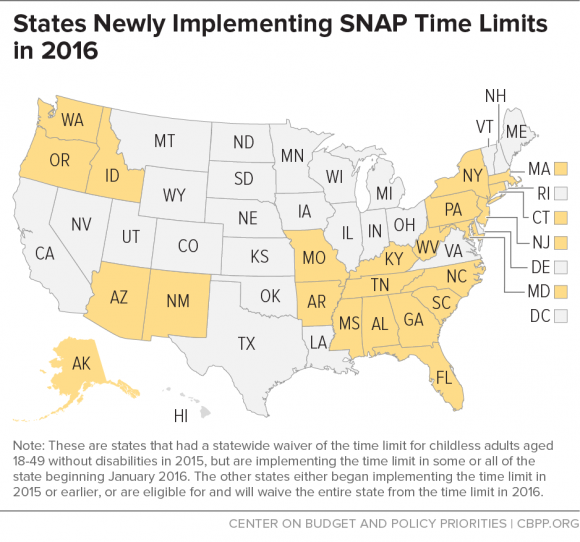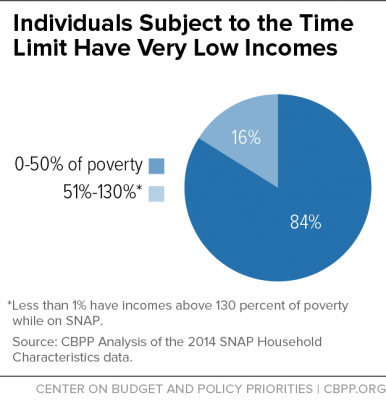At least 500,000 people will lose their food stamp benefits this year as many states revert back to a strict three-month limitation on benefits, according to a report from the Center on Budget and Policy Priorities.
At the extreme, as many as one million of the country’s poorest people will lose food assistance, which averages $150 to $170 per person per month.
Those affected are people aged 18 to 49 who aren’t disabled or raising minor children. Most of them live a subsistence existence, scraping by with the help of government and charitable organizations and low income jobs, although college students are also eligible.
Related: The Surprising Fact of Hunger in America
The landmark 1996 bipartisan welfare reform law crafted by a Republican Congress and signed by Democratic president Bill Clinton limited benefits for this group to just three months in any 36-month period unless they were employed or in a work-training program.
That provision was meant to show the government was serious in demanding that low income families and individuals make real efforts to find work or get necessary training as a condition of receiving supplemental food benefits.
But as the Great Recession set in beginning in December 2007, most states recognized there simply weren’t enough suitable jobs or openings in government training programs to go around. States either obtained federal waivers from enforcing the three-month limit or simply ignored it.
As the unemployment rate has fallen substantially in recent years -- to just 5 percent in December -- states have once again begun tightening the requirements, even though the recovery has been uneven and some fear another recessionary downturn.
According to the CBPP analysis, the three-month time limit will be back in force in more than 40 states -- including 23 states that haven’t imposed this requirement since the start of the recession.

“Even SNAP recipients whose state operates few or no employment programs and fails to offer them a spot in a work or training program—which is the case in most states—have their benefits cut off after three months, irrespective of whether they are searching diligently for a job,” the report states.
Related: Food Stamp Use Plummets Amid Job Growth
The Supplemental Nutrition Assistance Program (SNAP), as it is formally known, is a controversial program in Congress because of its huge cost and checkered track record for fraud and waste. The program served nearly 47 million people in fiscal 2014 at a cost of $76 billion.
The authors of the CBPP report -- Ed Bolen, Dottie Rosenbaum, Stacy Dean and Brynne Keith-Jennings -- say there are ways that Congress could revise the tough regulation to more effectively – and more humanely – achieve its stated goals.
One way would be to make the three-month limit in any state “contingent on the state offering a job or training position to all nondisabled childless adults subject to the limit who don’t otherwise find employment.”
Or lawmakers could decide to allow a “diligent job search” to count toward the requirement, as the government already does under work requirements for other social safety-net programs, according to the report.
That doesn’t seem like a heavy lift from a legislative standpoint compared to some of the other major items on the agenda this year. Republican and Democratic leaders are seeking compromise on criminal justice and sentencing reforms and new mental health programs aimed at cutting down on gun violence. Possibly they could find time to address the looming disaster for many low-income Americans.
But in the more likely event that Congress allows the tough food stamp rule to take hold again this year, state governments and local charities would be wise to brace for a deluge of requests for assistance from Americans being stripped of their food stamp benefits.






